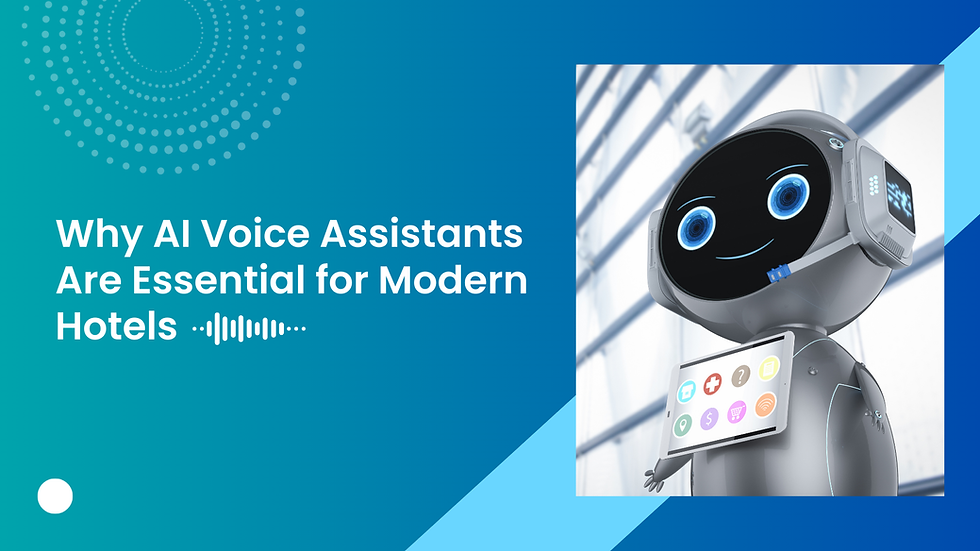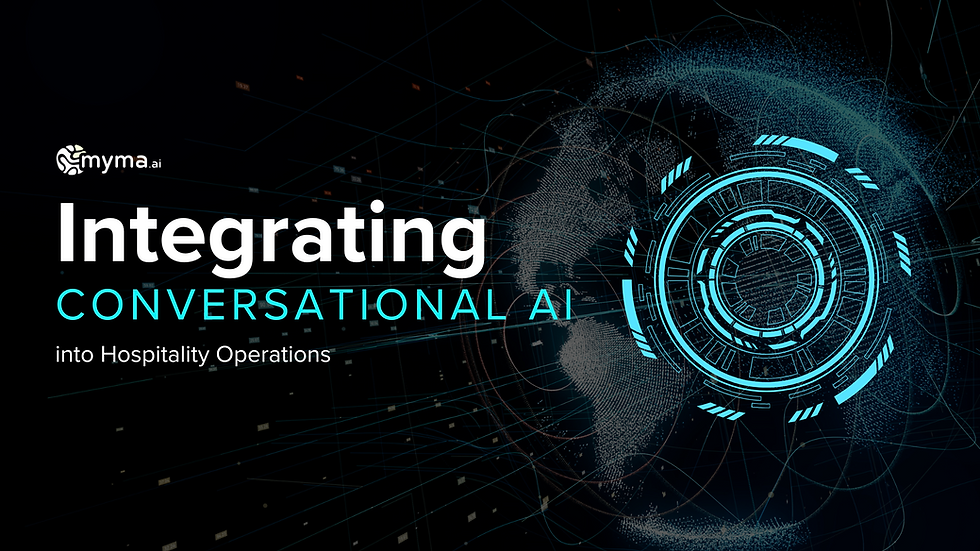Why AI voice assistants in hotels are so important - 2025 Guide
- Divyanshu Rawat

- Aug 18, 2025
- 5 min read

The hospitality industry is rapidly evolving, driven by guest expectations for convenience, efficiency, and personalized service. One technology leading this transformation is AI-powered voice assistants. These tools are revolutionizing how hotels operate by enhancing guest experiences and streamlining operations — not just in rooms, but across every corner of the hotel, from sprawling lobbies to gourmet restaurants and tranquil spas. By enabling hands-free, on-demand interactions, AI voice assistants have become a vital part of modern hotel ecosystems.
How AI Voice Assistants Enhance Guest Experiences Across the Hotel
Today’s guests demand speed, simplicity, and personalization. Smart voice assistants help hotels exceed these expectations at multiple touchpoints, creating a cohesive and seamless experience throughout the property.
Key Ways AI Voice Assistants Elevate Guest Interaction
Instant Access to Hotel Information
Forget long waits at the front desk. Guests can use voice commands to ask about amenities, event schedules, or spa availability from strategically placed voice-enabled kiosks or devices across the hotel.
Convenient Navigation Assistance
Finding amenities in large hotels can be challenging, but voice assistants provide quick, spoken directions to nearby facilities like restrooms, conference rooms, or the rooftop pool.
Simplified Dining and Activity Requests
Guests can reserve tables, order meals, or book activities just by speaking their preferences into devices in restaurants, lounges, or poolside.
Smart Concierge Services
Whether they need tickets to a local event, recommendations for sightseeing, or a ride to the airport, AI-assisted concierge services provide tailored support instantly.
Effortless Communication Between Guests and Staff
A missing towel at the spa or a lost item in the lobby doesn’t require a trip to reception. Voice assistants seamlessly log guest requests and route them to relevant departments for swift action.
With these features, AI voice assistants enable hotels to offer highly responsive, guest-centered service that saves time and enhances convenience.
Read More - AI Chatbot vs Live Agent
Operational Benefits of Smart Hotel Technology
AI voice assistants don’t just elevate the guest experience; they also provide immense benefits on the operational side, helping hotel staff and management optimize workflows and reduce costs.
Efficiency Through Automation
Handling Routine Queries
Staff no longer need to answer repetitive questions like, “What time does the pool close?” or “Where’s the nearest elevator?” These straightforward questions are swiftly managed by AI, lightening the workload on the front desk and concierge roles.
Streamlined Service Requests
When guests request housekeeping, maintenance, or valet services through voice commands, the system automatically logs the task and assigns it to the appropriate team. This eliminates miscommunication and accelerates service delivery.
24/7 Availability
Unlike human staff bound by work hours, voice assistants are available around the clock, ensuring guests receive uninterrupted assistance no matter the time.
Cost Savings Through Efficiency
Automating repetitive tasks allows hotels to cut down operating expenses while reallocating human staff to higher-value, hospitality-focused roles.
Enhanced Staff Productivity
By taking over time-consuming, repetitive tasks, AI voice assistants allow hotel employees to focus on more meaningful interactions. Whether it’s preparing personalized guest welcomes or providing complex concierge services, staff can dedicate their attention to areas where human touch matters most. The result? Higher employee satisfaction and improved guest relations.
Read More - GPT-5 in Travel & Hospitality
Personalization and Multilingual Support
One of the biggest draws of AI voice assistants is their ability to deliver hyper-personalized experiences, unhindered by language barriers. This ensures that every guest feels welcomed, no matter their background.
Creating Tailored Experiences
AI systems are designed to remember preferences and past interactions, creating a seamless and personalized experience for returning guests. For example:
A device in the spa might remind a returning guest of their favorite massage appointment time.
Dining suggestions and special offers can be tailored to a guest’s known dietary preferences through loyalty program integration.
This level of personalization turns ordinary hotel stays into unforgettable experiences, forging stronger guest loyalty.
Multilingual Assistance for International Travelers
Language can often be a source of stress for global travelers. AI voice assistants, armed with multilingual capabilities, erase this friction by supporting multiple languages and even accents. Whether a guest speaks French, Mandarin, or Arabic, they can interact with the systems effortlessly, making hotels more inclusive and welcoming.
Additionally, this capability minimizes the need for staff trained in multiple languages, increasing the hotel’s ability to cater to diverse audiences without added recruitment challenges.
Innovative Examples of AI in Hospitality
From global brands to boutique hotels, many in the hospitality industry are already reaping the rewards of AI-powered voice assistants. These systems go far beyond conventional applications and deliver innovative, hotel-wide support.
What Makes AI Voice Assistants Stand Out?
Natural Language Processing (NLP)
Systems like Myma AI allow seamless, human-like conversations between guests and devices.
Task Routing and Integration
AI voice assistants can communicate with multiple hotel systems — from housekeeping management to restaurant reservations — to ensure an uninterrupted flow of service.
24/7 Availability and Escalation Support
Operating around the clock, voice assistants also know when a problem requires human intervention. If an issue cannot be resolved by AI, the task is escalated to live staff promptly.
Beyond Traditional Applications
Hotels are taking these technologies beyond guest interactions. For example:
Conference Areas
Voice assistants guide attendees to breakout sessions, provide event schedules, and even relay changes in real-time.
Spa and Poolside Areas
Guests can book treatments, order drinks, or request towels without leaving their spot.
Corporate Meetings
Use voice assistants in boardrooms to control presentations and manage AV setups with ease.
By implementing these innovative applications, hotels can expand the scope of AI-driven service across their properties, leaving no space untouched by convenience.
FAQs
How do AI voice assistants benefit an entire hotel?
They provide instant access to information, automate service requests, streamline navigation, and facilitate multilingual communication across various areas — not just guest rooms.
Can guests use these assistants in common areas?
Absolutely. Common spaces like lobbies, restaurants, spas, and gyms are equipped with voice-enabled devices, ensuring assistance is readily available throughout the hotel.
Are these systems effective for non-English-speaking guests?
Yes. Most modern systems support multiple languages and accents to cater to a diverse guest demographic.
Do these tools replace hotel staff?
No. Their role is to complement staff efforts by automating routine tasks, freeing employees to focus on high-touch, personalized services.
Are AI voice assistants expensive to implement?
While initial implementation costs exist, the long-term savings in operating expenses, enhanced efficiency, and increased guest satisfaction often offer a strong return on investment.
Summary
AI voice assistants are revolutionizing hotel operations by creating seamless, guest-centric experiences across the property. Their utility stretches far beyond guest rooms, making them invaluable tools in lobbies, conference spaces, spas, and dining areas. By offering 24/7 assistance, improving operational efficiency, and providing multilingual support, AI voice assistants ensure that modern hotels stay ahead of guest expectations while optimizing their internal workflows.
Hotels that invest in voice AI technology today will be well-positioned to lead tomorrow’s hospitality landscape, delivering exceptional service and unforgettable stays.




Comments